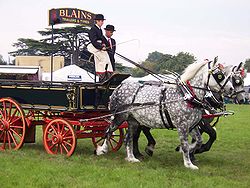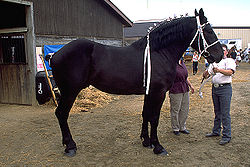| Line 1: | Line 1: | ||
[[Image:Pair_of_percherons.jpg|thumb|250px|A pair of very typical dapple grey Percheron Horses]] | [[Image:Pair_of_percherons.jpg|thumb|250px|A pair of very typical dapple grey Percheron Horses]] | ||
[[Image:PercheronDraftHorse.jpg|thumb|250px|Percheron draft horse at the Maryland State Fair]] | [[Image:PercheronDraftHorse.jpg|thumb|250px|Percheron draft horse at the Maryland State Fair]] | ||
| − | |||
| − | |||
| − | Percherons probably owe their size and weight to their use as battle mounts during the middle ages. After the invention of gunpowder, heavy warhorses were no longer needed, so the Percheron took up its new job pulling heavy French | + | The '''Percheron''' gets its name from the [[Perche]] valley in the north of France. |
| + | |||
| + | ==History== | ||
| + | Like many old breeds, the Percheron's exact origins are unknown, but it is said that its ancestors were the [[Arabian horse|Arabians]] that were brought to Europe by the [[Moors]]. Percherons probably owe their size and weight to their use as [[Horses in warfare|battle mounts]] during the middle ages. After the invention of gunpowder, heavy warhorses were no longer needed, so the Percheron took up its new job pulling heavy French [[stagecoach]]s. With the invention of the railroad, Percherons switched to farm duty and heavy labor. | ||
It is probably because of this evolution that the modern Percheron is such a versatile and adaptable horse. Today, Percherons still serve as logging horses, but are also valued as pleasure driving horses, riding horses, and show horses. | It is probably because of this evolution that the modern Percheron is such a versatile and adaptable horse. Today, Percherons still serve as logging horses, but are also valued as pleasure driving horses, riding horses, and show horses. | ||
| + | <!-- Can't work out how to blend this in. It seems to be a cut and paste from somewhere else' | ||
| − | + | Percherons are noted for heavy muscling in the lower thighs and for an aspect of unusual ruggedness and power. Also characteristic of the Percheron is the clean action and quality conformation of the feet and legs. An ideal horse should have a fairly long level croup with a big round hip. He should be close coupled and wide and deep through the chest, with plenty of back rib. The muscles of the arms, forearms, croup and gaskins plenty are especially emphasized in a good drafter, and ease and balance of gait is essential. He is also expected to be of marked tractability and an easy keeper. | |
| − | |||
| − | |||
| − | |||
| − | |||
| − | |||
| − | |||
| − | |||
| − | + | The Percheron head and neck are typical of the most attractive draft horse character. Good Percherons have a large and full prominent eye, a broad and full forehead, and straight face. His strong jaw and refined ears attractively set and carried with animation, suggests his arabian ancestry. Stallions should have a ruggedness about the head and mares should have a feminine look. --> | |
| − | + | ==Conformation== | |
| + | The Percheron is characterized by a square forehead, long ears, and a straight profile. Some percherons have long, heavy necks, a broad chest, prominent [[withers]], a short back, heavy muscles in the lower thigh, and a deep girth. A quality example of this breed should have a long croup and a round hip. | ||
| − | + | However in recent years, Percherons have become more modern, having a long thin neck, a long back, and slender muscles. These types of modern percherons are used mainly as show horses for competition. The Percheron's mane is generally very thick and the color is always grey or black. | |
| − | |||
| − | |||
| − | |||
| − | |||
| − | |||
| − | + | ==Temperament== | |
| + | The Percheron has a very pleasing disposition, and is proud, alert, and intelligent. They are generally very gentle horses, well-suited for driving, and are strong and willing workers. The Percheron is readily adapted to varying climates and conditions. They have the strength to pull heavy loads and the graceful style to pull a fine carriage. Percherons can be ridden and some have been known to make fine jumpers. | ||
| − | + | ==Colour== | |
| + | Percherons are generally [[black (horse)|black]] or [[Gray (horse)|gray]], though [[Chestnut (coat)|chestnut]], [[Sorrel (horse)|sorrel]], or [[Bay (horse)|bay]] are acceptable for registration in the US with a [[Genetic fingerprinting|DNA test]] confirming their parentage. The red gene is recessive, and a red foal can result from the mating of two black horses providing that the red gene is present in both sire and dam. North American horses with a high percentage of '''Justamere Showtime''' breeding are more likely to carry the recessive gene. | ||
| + | Many Percherons have white markings on the head and feet, but excessive white is undesirable. | ||
| + | ==Height and weight== | ||
| + | Percherons range in height from 15 to 19 hands high, most are between 16-2 and 17-3 hands high. They can weigh up to 2600 pounds with the average around 1900. One of the tallest horses on record was a Percheron named Dr Le Gear. Foaled in 1902, he stood 7 feet or 21 [[Hand (unit)|hands]] at the withers and weighed just under 1,370kg. However, there was once a Percheron on record that rose to a full 24 hands. | ||
| + | ==Life-span== | ||
| + | An Percheron's average life span is between 15 and 25 years. | ||
==External links== | ==External links== | ||
Revision as of 02:34, 1 February 2007
The Percheron gets its name from the Perche valley in the north of France.
History
Like many old breeds, the Percheron's exact origins are unknown, but it is said that its ancestors were the Arabians that were brought to Europe by the Moors. Percherons probably owe their size and weight to their use as battle mounts during the middle ages. After the invention of gunpowder, heavy warhorses were no longer needed, so the Percheron took up its new job pulling heavy French stagecoachs. With the invention of the railroad, Percherons switched to farm duty and heavy labor.
It is probably because of this evolution that the modern Percheron is such a versatile and adaptable horse. Today, Percherons still serve as logging horses, but are also valued as pleasure driving horses, riding horses, and show horses.
Conformation
The Percheron is characterized by a square forehead, long ears, and a straight profile. Some percherons have long, heavy necks, a broad chest, prominent withers, a short back, heavy muscles in the lower thigh, and a deep girth. A quality example of this breed should have a long croup and a round hip.
However in recent years, Percherons have become more modern, having a long thin neck, a long back, and slender muscles. These types of modern percherons are used mainly as show horses for competition. The Percheron's mane is generally very thick and the color is always grey or black.
Temperament
The Percheron has a very pleasing disposition, and is proud, alert, and intelligent. They are generally very gentle horses, well-suited for driving, and are strong and willing workers. The Percheron is readily adapted to varying climates and conditions. They have the strength to pull heavy loads and the graceful style to pull a fine carriage. Percherons can be ridden and some have been known to make fine jumpers.
Colour
Percherons are generally black or gray, though chestnut, sorrel, or bay are acceptable for registration in the US with a DNA test confirming their parentage. The red gene is recessive, and a red foal can result from the mating of two black horses providing that the red gene is present in both sire and dam. North American horses with a high percentage of Justamere Showtime breeding are more likely to carry the recessive gene.
Many Percherons have white markings on the head and feet, but excessive white is undesirable.
Height and weight
Percherons range in height from 15 to 19 hands high, most are between 16-2 and 17-3 hands high. They can weigh up to 2600 pounds with the average around 1900. One of the tallest horses on record was a Percheron named Dr Le Gear. Foaled in 1902, he stood 7 feet or 21 hands at the withers and weighed just under 1,370kg. However, there was once a Percheron on record that rose to a full 24 hands.
Life-span
An Percheron's average life span is between 15 and 25 years.
External links
- Societe hippique Percheronne de France
- Percheron Horse Association of America
- Oklahoma State University's Percheron Page
- British Percheron Horse Society
de:Percheron fr:Percheron ja:ペルシュロン pl:Perszeron fi:Perchenhevonen


